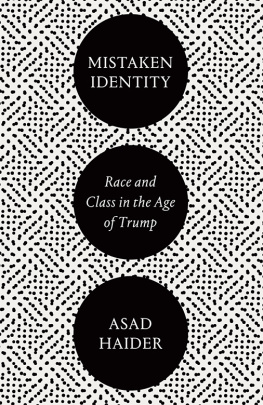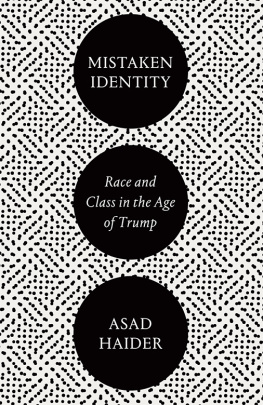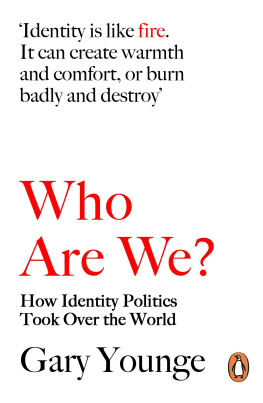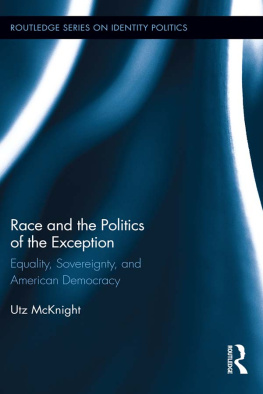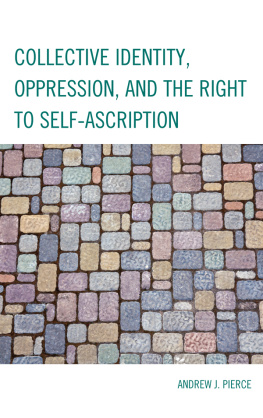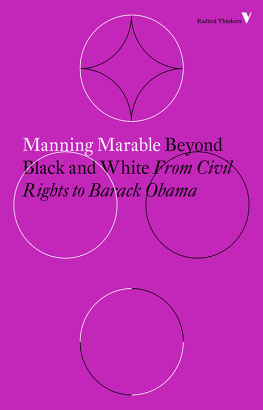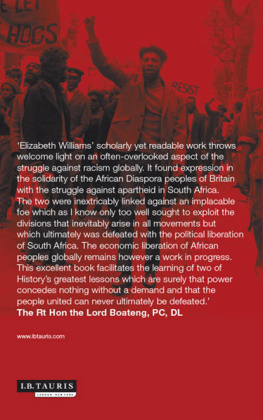Names: Haider, Asad, author.
Title: Mistaken identity : race and class in the age of Trump / Asad Haider.
Description: London ; Brooklyn, NY : Verso, 2018. | Includes bibliographical references.
Identifiers: LCCN 2017051520| ISBN 1786637375 (pbk.) | ISBN 9781786637390 (UK EBK) | ISBN 9781786637383 (US EBK)
Subjects: LCSH: Political cultureUnited States. | Identity politicsUnited States. | United StatesRace relationsPolitical aspects. | African AmericansPolitics and government. | WhitesUnited StatesPolitics and government. | United StatesSocial conditions21st century.
I first have to thank Chris Connery, who encouraged me to write this book, who was the first reader of the completed manuscript, and who pushed me to make it come together as a whole, and Ben Mabie, who is responsible for giving this idea a concrete form in his capacity as publishing impresario and editor. Both were also valued interlocutors in the formation of the ideas this book presents.
Indeed, these ideas were produced collectively along with friends, comrades, and colleagues. I cannot possibly mention them all, but I hope they all recognize my enormous gratitude. I will mention here those who discussed these questions with me in the whirlwind of political practice, those who encouraged me to record my thoughts and helped me to make them comprehensible, and those who valiantly read and commented on the entire draft: Robert Cavooris, Deborah Gould, Erin Gray, Evan Grupsmith, David Lau, Patrick King, Wendell Hassan Marsh, Dave Mesing, G.S. Sahota, Jason Smith, Alberto Toscano, Delio Vasquez, Gavin Walker, and Philip Wohlstetter.
My adventures in publishing began with an intellectual and political collaboration with Salar Mohandesi, whose influence is present throughout this book. Along the way I have come to collaborate with the entire Viewpoint collective, and all of them have been valued readers, critics, and interlocutors.
The historical details of the manuscript were reviewed by Emma Teitelman, Tim Barker, and Matt Karp, whose encouragement I greatly appreciated. Sarah Greys precise and perceptive copy editing gave the text an indispensable refinement. Any remaining errors are my own responsibility.
I have probably not had a single idea in my life that was not formed in some kind of dialogue with my brother, Shuja Haider. He has emerged as one of the most significant critics of identity politics today; if I have not cited him in this book, it is only to avoid confusing readers.
Without the constant personal support of Julie McIntyre, I would never have produced anything. She is also the source of far more intellectual stimulation and inspiration than she is willing to admit. I am eagerly looking forward to her first book.
I dedicate this book to my parents, Jawaid Haider and Talat Azhar, who taught me never to compromise on ethical principles, even if they go against the prevailing wisdom and incur the wrath of the authorities.
We all have to be born somewhere, wrote the philosopher Louis Althusser. I was born in a small town in Central Pennsylvania, though it was hard to figure out why. No one could pronounce my name, and at home we spoke another language; and every other summer we packed up and spent long, excruciating hours in airplanes to see our extended family in Karachi.
Im not so sure I emerged from this experience with anything resembling an identity. Whatever bits and parts may have constituted my selfhood appeared to be scattered all over the globe. Identity, paradoxically, appeared to be externally determinedor perhaps more saliently, not determined. Between the white kids in Pennsylvania who asked me where I was from (not Pennsylvania, apparently) and the Pakistani relatives who pointed out my American accent, it seemed that if I did have an identity, no one was really prepared to recognize it.
But I suppose I came to experience my identity differently in September of 2001. One day I arrived at school and learned that the country had been attacked, and for the rest of the day we watched planes crashing into the World Trade Center, over and over. I had trouble parsing the reactions of my classmates. Understandably, they were horrified, angry, devastated. I was puzzled.
It wasnt unusual to see reports of terrorist incidents, military actions, and even coups in Pakistan on TV. I remember a newscaster solemnly intoning that Karachi was the most violent city in the world. In my childhood summers there, I had seen the streets filled with children like me, who were homeless, starving, too weak to bat the flies off their bodies. Something in the political geometry was out of alignment, and the view from Pennsylvania seemed inordinately narrow. When Bill Clinton ordered a missile attack on the Al-Shifa pharmaceutical plant in Sudan, my sixth-grade teacher had us sit down and write a paragraph explaining why such an act was necessary. But I knew that on the other side of the television screen there was a mass of human beings who saw things differently.
The collapse of the Twin Towers, which we watched with disbelief, also reverberated in my everyday experience. Until then, I had learned to live with a culture of condescending and exclusionary toleration. But now it revealed an undercurrent of open hostility. I found myself being called Osama by my classmates while the teacher watched with either apathy or agreement. I was seized with unexpected fear at the ice-cream shop when an avuncular old white man suddenly scowled at the sight of my family and began ranting in our direction about terrorists from Iraq, as we made our way to a table, threateningly wielding cones of cookies-and-cream.
My identity had become a matter of homeland security. But how could I respond to such a scenario? Should I proudly claim a fixed Pakistani identity, one that never felt quite like the right fit, that belonged to a place on the other side of the world? Or should I assimilate into the world of whiteness around me, even though it was racist and parochial and had never really welcomed me?
If there was an answer to these questions, it was not supplied at school. So, alongside my other readingsmost memorably the Communist Manifesto and Tropic of CancerI began to study the question of identity. But this was not in order to adopt an identity. Between Marx and Engelss Workers of the world, unite! and Henry Millers nomadismin which, as Gilles Deleuze put it, everything is departure, becoming, passage, leap, daemon, relationship with the outsideI was convinced of the impossibility of settling on fixed territory.

